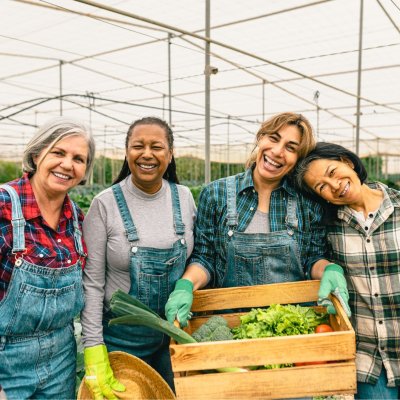Around the UK, local food systems are helping to create thriving town centres, stronger local economies and fresher, more delicious food in climate and nature-friendly ways.
And local food brings resilience. In a world increasingly impacted by climate and political disruption, having more food production close to where people live is just common sense.
We asked 60 local food actors what benefits they directly witness from local food systems. Their answers revealed 8 main benefits that fall into in two broad groups.

Despite all these benefits, local food systems have been squeezed out in recent decades by the dominant industrial food system. A whole range of barriers; from the political, to the financial to the infrastructural, stand in the way of local food systems delivering as much for communities, economies and nature that we know they can.
Things can be different. We can grow our local food systems to help us address some of the biggest environmental, social, economic and wellbeing challenges we face today. The Local Food Growth Plan addresses how we can do that.
Check out Sustain’s report The Case For Local Food for more detail on the benefits.

Local food means different things to different people – in fact a literature review we conducted revealed 80 different definitions! Our definition is as follows:
“Local food is food that is produced, processed, sold and eatedn within the same region [or local administrative area] through transparent, SME-focused supply chains.”
Review of local food definitions report
Not at all! Not all types of food can be produced everywhere at all times of year. So we need our food to come from a mix of places. We’re big fans of the Food Zones model created by Growing Communities.
But we know that much more of our food could be produced much closer to where people live and that that brings resilience for our communities in disruptive times.
The produce I was supplying the restaurants lasts two weeks longer than anything else they're getting because they're getting it straight from the farm, you know, so why wouldn't anyone want that?
SourceGrow Northern Ireland

Local food just ticks a lot of boxes; environment, community, connection between farmer and consumer, economic benefits to the local area, and more resilience.
Seb Mayfield, Ooooby
Local food systems respond quicker than big ones. They are built on relationships between people, and help people build relationships. It's not competitive, they all support each other and are bigger than the sum of their parts.
Nikki Storrar, Farmer

© Sustain 2026 Registered charity (no. 1018643) Data privacy & cookies